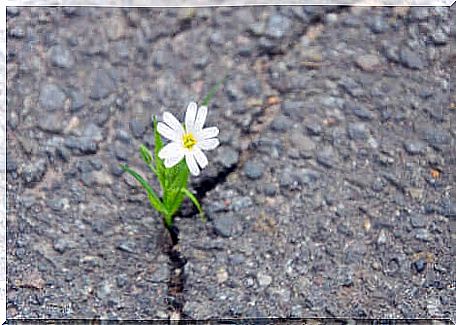The Metaphor Of Orange: When Life Is Pressing Us …

If someone were to annoy you or tease you or, metaphorically, rush you, what would come out of you? Anger ? Happiness ? Rabies? The orange metaphor, posed by psychologist, teacher, and writer Wayne Dyer, helps us understand why it’s so important to know what’s inside of us.
Wayne Dyer is known to have lectured in different countries. His success came with the publication of his famous book Your Wrong Zones . The metaphor of the orange appeared in one of his conferences, in Toronto (Canada), and has the particularity of having taken place the day before his death.
His presentation, which is part of the I can do lecture series , surprised everyone: Wayne took an orange on stage to support his explanations. He then entered into a dialogue with a brilliant 12-year-old boy sitting in the front row.

The dialogue of the orange metaphor
“If I squeeze this orange as hard as I can, what will come out of it?” Dyer asked. The boy looked at him like he was crazy and replied, “Juice, of course.” Dyer replied, “Do you think apple juice could come out of it?” “No,” the little boy said, laughing. “How about grapefruit juice?” “No.” “What would result?” “Orange juice, of course.”
“Why ? Why, when you squeeze an orange, does orange juice come out? ” At this point, the young man might already be on the verge of despair, but he still said: “It’s an orange, and that’s what’s inside”. Wayne nodded and continued.
“Suppose this orange is not an orange. And that’s you. Imagine that someone presses you, puts pressure on you, says something to you that you don’t like, that offends you. Why is it coming out? ”
What comes out of you when you are pressed for time?
“If anger or pain or fear comes out, it’s because that’s what’s inside. It doesn’t matter who’s pushing you, your mom, your partner, your kids, your boss, your subordinate… If someone says something about you that you don’t like, what’s in you will come out. And what’s inside is your choice. ”
“If nothing comes out of you except love, it is because you have allowed it. Once you remove all of those consuming emotions (envy, hate, resentment, revenge…) and replace them with love, you live a very functional life. ” “Thank you, my young friend,” Wayne said. “This orange is for you.”
Orange metaphor and resilience
And what better way to continue the orange metaphor than with another citrus moral. I’m sure you’ve heard the phrase “If life gives you lemons, make lemonade”. But, have you ever thought about what that means? This phrase, far from being tied to conformism, is probably one of the simplest ways to define resilience.
Resilience is a word that comes from Latin ( resilio , resilire ) and means “to bounce back”. Applied to psychology, it refers to the ability of people to overcome adversity and move forward. Consequently, resilient people would be those who manage to make lemonade with the lemons that life offers them: losses, disappointments, ruptures …
We used to think that resilience was something we were born with, that it was genetic. However, subsequent research has shown that this ability can be trained. How? ‘Or’ What ?
For example, accepting that changes are a part of life, trusting yourself and taking care of your social relationships. You also need to focus on the positive, see challenges as opportunities or be flexible and realistic in your goals.

Do you cultivate
In conclusion, the metaphor of the orange and that of the lemon come together to make us understand the importance of cultivating our inner self. If we fill it with poor soil, weeds will grow. If, on the other hand, we water it frequently and pamper it, it will be more difficult for the harmful elements to move inside us.
Therefore, filling ourselves with toxic thoughts or feelings does us no good. At the end of the day, the only ones who suffer are ourselves. Who suffers from all the urge we feel? We. Who does our desire for revenge affect? On us.
We ourselves will suffer the consequences of keeping these kinds of emotions in us. This is why if, as the expression says, revenge is a dish that is eaten cold cold, and it is generally served to the two protagonists: the one who exercises it and the one who receives it.









